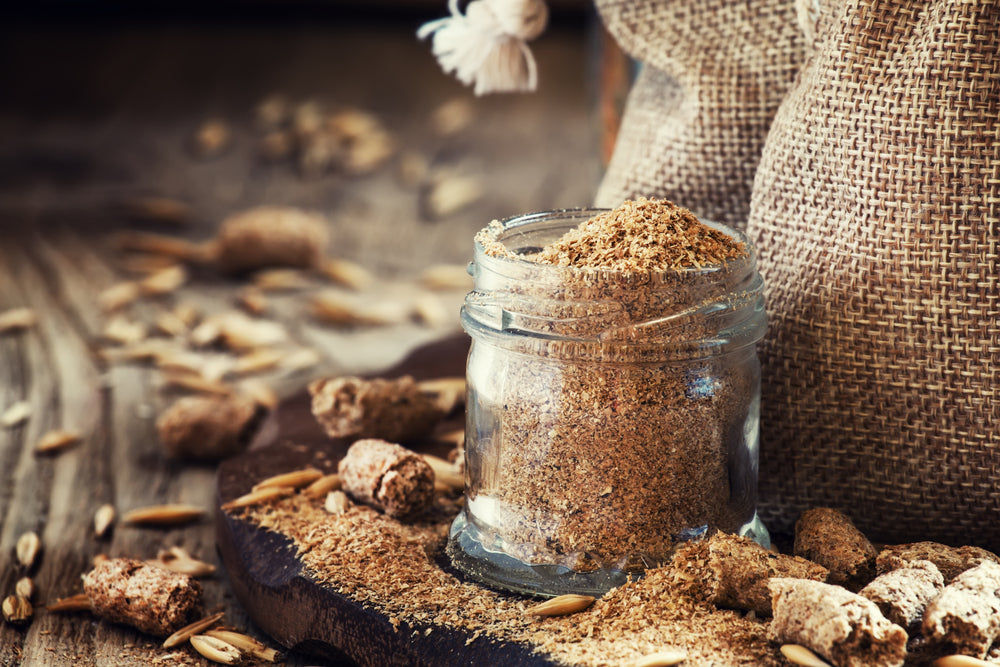Oat bran is a nutrient-dense, soluble fiber that comes from the outer layers of the whole oat grain. It has been shown to effectively help maintain a healthy gut; manage weight; and lower cholesterol, blood glucose and blood pressure levels. In addition, oat bran consumption benefits immune system functionality and overall digestion. Because of its high nutrient and fiber density, we selected oat bran as a key ingredient in our Eden’s 3-in-1 Synbiotic Supplement, which also contains a menu of other prebiotics, probiotics, and polyphenols — all formulated to give your gut what it needs to optimize your health.
[[mailing_list]]
What is oat bran?
Oat bran is the outermost layer of the oat groat, which is the whole grain form of oats. It is the part that surrounds the oat kernel, consisting of the bran and the endosperm layers, and is rich in vitamins, minerals, and dietary fiber — particularly a soluble prebiotic fiber called beta glucan.
The prebiotic power of oat bran
Oat bran is high in fiber, including prebiotic fiber. (In addition to whole grains, such as oat bran, many vegetables, fruits, nuts and seeds are rich in prebiotic fibers.)
While all types of fiber (insoluble and soluble fiber) are crucial components of a healthy diet, prebiotics have unique benefits that support greater health and well-being. Prebiotic fibers selectively stimulate the growth and metabolic activity of gut microbes. They are digested quickly by microbes that produce beneficial molecules for humans, including the important and beneficial short-chain fatty acids (SCFAs) — butyrate, acetate, and propionate — which are believed to play a role in regulating appetite and digestive functioning, immune system functioning, lipid levels, blood sugar levels, and more. Prebiotics increase nutrient absorption, promote the growth of beneficial microbes, and support a healthy immune system. Prebiotics also have demonstrated benefits in an overall weight-loss program.
Oat bran’s beta glucan: A special prebiotic
Oat bran is a significant source of oat beta glucan, a type of soluble fiber found in the cell walls of oats. Beta glucan is a prebiotic fiber found in cereal grains, fungi, yeast, and seaweed. Of all the cereal grains, oat and barley have the greatest beta glucan content, making them ideal staples for your everyday diet. (Medicinal mushrooms also contain beta glucan, with turkey tail ranking amongst the top for highest beta glucan content.)
Beta glucan is the same prebiotic fiber component from source to source; however, depending on the source, beta glucan may have a different molecular mass, viscosity, and branching structure, which may affect its overall solubility (ability to dissolve in water) and quality.
Health benefits of oat bran
Oat bran, including oat beta glucan, has many health benefits, including:
Digestive health. The fiber in oat bran supports a healthy digestive system by preventing constipation and promoting regular bowel movements.
Gut health. Oat bran’s high fiber keeps things moving and fermenting in the gut, and its high beta-glucan content acts as a prebiotic, providing nourishment for beneficial gut bacteria. This can support a healthy gut microbiome and contribute to overall digestive and metabolic health.
Nutrient-rich. Oat bran contains various vitamins and minerals, including B vitamins, vitamin E, iron, magnesium, and zinc. These nutrients play important roles in energy production, immune function, and overall well-being.
Weight management. Since oat bran’s fiber forms a gel-like substance when mixed with water, it slows down digestion and promotes a feeling of fullness, known as satiety, which makes it beneficial for weight management. Foods that keep you satiated help you hold back from overeating throughout the day.
Glucose management. Fiber plays an important role in blood sugar regulation and diabetes management. Unlike other carbohydrates that are digested by the body and broken down into sugar, fiber is not digestible, which helps slow the overall rate at which your body breaks down food. Foods high in fiber help to minimize blood sugar spikes that contribute to an ineffective use of insulin in the body for blood sugar regulation. Numerous studies, such as this randomized controlled clinical trial, show that oat beta glucan is particularly effective at slowing gastric emptying, lengthening intestinal transit time and delaying sugar absorption. Because oat beta glucan slows down the digestion and absorption of carbohydrates, glucose is released more gradually into the bloodstream. This helps regulate blood sugar levels and may be beneficial for individuals with diabetes or those aiming to prevent blood sugar spikes.
Cardiovascular health. As with other soluble fibers, oat bran forms a viscous "mesh" that captures cholesterol-related particles so they are passed harmlessly out of the body through the excretion of bile. During this process, the body excretes more of the "bad" (LDL) cholesterol than it does "good" (HDL) cholesterol, thereby lowering LDL cholesterol in the blood vessels, which improves heart and vascular health. (Learn more: Why are lipid levels important?) The Food & Drug Administration (FDA) officially recognized the link between oat beta glucan and a decreased risk of cardiovascular disease in 1997, and has since authorized the highest level claim for oat bran and reduction of coronary heart disease.
Blood pressure management. High blood pressure, or hypertension, increases the strain on your heart and blood vessels because they are working harder to pump and circulate blood throughout the body. Beta glucan may have antihypertensive properties that benefit blood pressure, although more human studies are needed to confirm this impact.
Enhanced immune function. Beta glucan has been widely studied for its beneficial impact on the immune system. One way that beta glucan helps the immune system is by training innate immune cells to have a more effective response against harmful threats in the body, such as a pathogen invasion. This may be why beta glucan is strongly associated with anticancer properties, particularly for HPV or cervical cancer, and possibly certain other cancers, as well. While beta glucan has not been found to reverse cancer, it may inhibit the growth of cancer and tumors and so prove efficacious when used in conjunction with traditional cancer therapies.
What foods contain oat bran?
Oat bran is a versatile ingredient and most commonly consumed as a breakfast cereal or added to baked goods, such as bread, muffins, and cookies. It has a slightly nutty flavor and a soft, porridge-like texture when cooked. It can be cooked on its own or combined with other grains or ingredients to enhance its taste and nutritional profile.
See our article, 8 high satiety foods to keep you feeling full for longer, which includes several creative oatmeal recipes.
Where to buy oat bran: Can you get oat bran in a supplement?
If you find that you are not consuming quite enough prebiotic fiber naturally from foods, prebiotic supplements may be a convenient alternative. But where can you buy oat bran? Eden's 3-in-1 Synbiotic Supplement contains five carefully chosen prebiotics, including oat bran, along with barley beta glucan, guar gum, locust bean gum, and resistant potato starch. Eden’s, as a synbiotic, also contains several carefully chosen probiotics and polyphenols, which complement the prebiotics to help you maximize your digestive, metabolic, cardiovascular and immune health. (Learn more: What is a synbiotic?). Get Eden's at the link below for your fix of daily oat bran.
[[product]]
Are there side effects to eating oat bran?
The Food and Drug Administration (FDA) has increased the recommended daily value for fiber from 25g to 28g. While oat bran consumption typically doesn’t cause digestive issues, drastically changing from a low-fiber to a high-fiber diet could bring on some discomfort or pain in the digestive area. You may experience symptoms such as constipation, diarrhea, or cramping. Therefore, increasing your fiber intake substantially over a very short period is ill-advised; instead, increase your intake gradually.
Is oat bran gluten free?
As we mentioned, oat bran is derived directly from the oat groat, and because the oat grain is naturally gluten-free, oat bran is gluten free as well. That being said, not all varieties of oat bran are safe for individuals with celiac disease or a gluten sensitivity. When purchasing oat bran, you must buy one that was processed in a gluten-free facility. Eden's Synbiotic contains only trace amounts of gluten (<40ppm), so the product may be better tolerated by people with gluten sensitivity.
Key takeaways
So, what is oat bran? Oat bran is a well-known source of whole grain fiber, making it a great food to incorporate in your daily diet. Because of its nutrient density and high fiber content, including prebiotic fiber, oat bran offers a wide array of health benefits impacting digestive and gut health, immune functioning, metabolic health, and cardiovascular health. Most of the population consumes far too little fiber, yet there are supplements on the market that enable you to reap the benefits of fibers, including oat bran. One such supplement that combines the power of oat bran with other beneficial prebiotics, probiotics and polyphenols is the Eden's Synbiotic Supplement.

